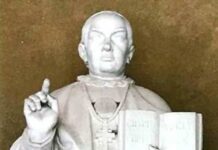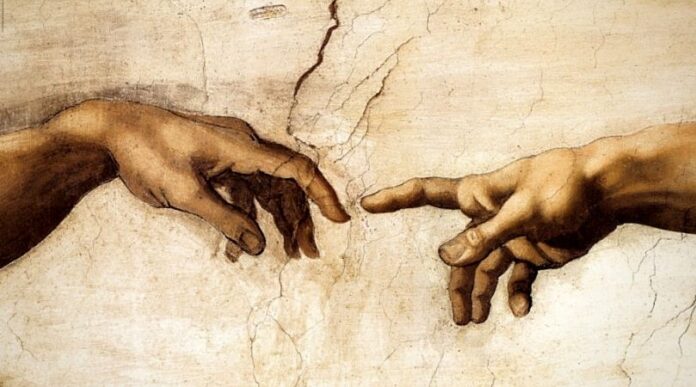You are not signed in as a Premium user; we rely on Premium users to support our news reporting.
Sign in or Sign up today!
Creation, man and woman, marriage, procreation and eternal destiny: These are five principles that have been, in one way or another, attacked since the beginning of time. But in today’s world, the onslaught against them has become most intense.

The materialistic Darwinian evolution of the 19th century contradicts the Biblical account of creation. Over 80% of U.S. adults say humans evolved over time — with a full 33% fully denying the biblical account of creation, claiming there is “no involvement by God.”
Today’s transgender ideology distorts and even destroys the reality of man and woman. Ominously, 62% of Americans now say they are more supportive of so-called transgender rights than they were five years ago.
The recent legalization of so-called gay marriage sought to redefine a God-given sacrament. Support for same-sex “marriage” is now at a record high — with nearly 70% saying it should be legally valid.
The abortion mindset, in which contraception plays a key role, aims solely at pleasure — devaluing procreation and, ultimately, affirmatively destroying new lives. More than 60% of U.S. adults say that murder of the unborn should be legal in all or most cases, and among self-described Catholics, that number is virtually the same at 56%.
And the many branches of atheism (e.g., Marxism and humanism), deny that man’s destiny is eternal or supernatural. This has caused Christianity to plummet in the United States — going from 77% popular adherence to 65% in just 10 years. And it follows that the religiously unaffiliated group has shot up from 17% to 26% in just 10 short years.
But Theology of the Body, as propounded by Pope John Paul II, traces its roots all the way back to the very creation of man. Theology is a science (as it’s the study of God), and under its penumbra, there are many different dynamics or aspects — with man’s material body being one of them.
Although this part of theology finds itself at the heart of another science, anthropology, which is the study of humans, looking at humanity with regard to its supernatural end is why it’s under the heading of theology.
Over recent decades, the phrase “theology of the body” became more well known around the world — largely owing to the work of Pope John Paul II.
This work contains a compilation of 129 Wednesday Audience addresses over a period of several years (from Sept. 5, 1979 to Nov. 28, 1984).
The work consists of many different topics, all centered on the theology of the body:
- Analysis of the biblical account of creation
- Man and woman: a gift for each other
- The unity and indissolubility of marriage
- Analysis of knowledge and of procreation
- The kingdom of God, not the world, is man’s eternal destiny
On the biblical account of creation, the first utterance of Scripture reads: “In the beginning, God created the heavens and the earth.” Opposing this most basic truth of not only faith but also natural reason was Charles Darwin, with his infamous theory of evolution.
As is a requirement of subscribing to this theory, Darwin viciously opposed Christianity, saying in his autobiography: “I gradually came to disbelieve in Christianity as a divine revelation.” He further referred to the Biblical teaching on Hell as “a damnable doctrine.”
The attempt to erase male and female is a more recent doctrine that, over time, has been fully embraced by the Left.
Darwin’s bulldog, as many called him, was Thomas Huxley, who called the Church the “enemy of the highest intellectual, moral and social life of mankind.”

In defense of Catholic doctrine, on the other hand, was Pope St. Pius X. In his famous 1907 encyclical On the Doctrine of the Modernists, Pius X named evolution as “among the chief of their doctrines.”
On the topic of man and woman as a gift for each other, Scripture explains, “Male and female he created them.” The attempt to blur and ultimately erase male and female is a more recent secularist doctrine, one that over time has been fully embraced by the Left.
On the unity and indissolubility of marriage, Pope John Paul notes that when the Pharisees asked Christ about marriage and divorce, He referred twice to “the beginning.” Our Lord then underscored humanity’s dichotomous creation — that God “made them male and female.”
In 2015, however, the U.S. Supreme Court ruled 5–4 in favor of so-called gay marriage. The attempted dismantling of the sacrament of marriage is now widely accepted in America and in many other parts of the world. But what’s more troubling is that even within the Catholic Church — which definitively teaches that marriage is a vocation between one man and one woman and that homosexual acts are of “grave depravity” and are “intrinsically disordered” — there are many clerics who openly contradict these truths.

On the subject of procreation, “since the first century, the Church has affirmed the moral evil of every procured abortion.” Following what the Church has always taught, Pope Pius XI also condemns contraception in his 1930 encyclical Casti Connubii, saying that those who use it “sin against nature and commit a deed which is shameful and intrinsically vicious.”
These two intrinsic evils were legalized in the United States in 1965 and 1973, respectively, pursuant to the so-called “right to privacy” — a right not found on the face of the Constitution.
The clerics who dissent on this teaching hide their opposition under the seamless garment theory, an idea popularized in 1984 by Chicago’s archbishop, the late Cdl. Joseph Bernardin. The erroneous proposition seeks to draw a moral equivalency between all social justice issues that relate to human life and enterprise. This quack theology thus puts the slaughter of innocent children on the same moral plane as immigration, racism, unemployment and the like.
In John Paul’s address titled, “The Kingdom of God, Not the World, Is Man’s Eternal Destiny,” the saint teaches, “Man cannot become too attached to the goods that are linked to a perishable world.”
This truth is attacked by the atheistic views of Marxism and humanism. Both philosophies, for the most part, deny the existence of the supernatural. In so doing, a utopia or “heaven on earth” becomes the goal, since Heaven can ostensibly never be achieved in the next life.
Since the first century, the Church has affirmed the moral evil of every procured abortion.
Rejecting God and the truth of man’s supernatural end, Karl Marx claimed, “We do not transform earthly questions into theological questions. We transform theological questions into earthly ones.”
With humanism, however, the atheistic philosophy is a little less hidden: Its motto is “Good without a God.”
— Campaign 31540 —
Have a news tip? Submit news to our tip line.

We rely on you to support our news reporting. Please donate today.
























